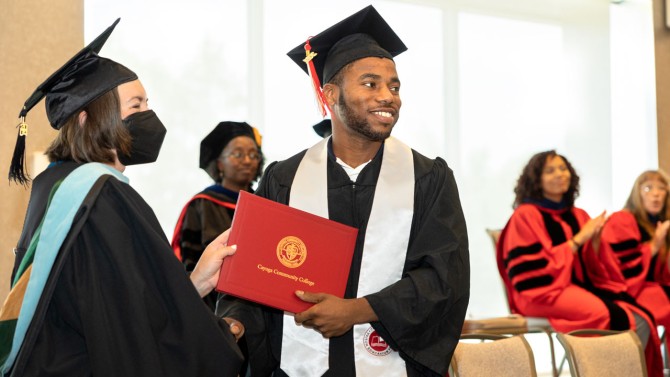
Cornell Prison Education Program graduate Kenneth Rogers speaks during a July 10 commencement ceremony at the Statler Hotel.
Former prison students celebrate college degrees
By James Dean, Cornell Chronicle
If the Cornell Prison Education Program (CPEP) had held a commencement ceremony last December as planned, Kenneth Rogers would have delivered his speech wearing an inmate’s green uniform beneath his cap and gown. Guards would have monitored the proceedings at the Cayuga Correctional Facility in Moravia, New York.
But after pandemic protocols scuttled that event, the program invited 17 graduates released from prison since the pandemic began to a Statler Hotel ballroom to celebrate completing at least an associate’s degree. Ten were able to attend the July 10 ceremony and buffet lunch, joined by roughly 100 family members and Cornell faculty members who participate in CPEP as volunteers.
Rogers, a 34-year-old Rochester native released in April, said he and fellow graduates had succeeded in translating desire into action.
“We’d wake up every single day in a place that was very dark and wanted to be better – and then did it,” he said.
To applause, nine graduates were awarded associate’s degrees by Cayuga Community College, part of the State University of New York: Jonathan Istvan; Darryl Miller; Rogers; Victor Saunders; Philip Taft; Angel Torres; Jeffrey Whitmore; Lamont Williams; and Timothy Wyatt.
Three graduates – Rogers, Miller and Michael Shino – earned a Certificate in Liberal Arts from Cornell, presented by Katherine McComas, vice provost for engagement and land grant affairs, and Keisha Slaughter, associate director of curriculum and programming at CPEP.
Rob Scott, CPEP executive director and adjunct assistant professor of global development in the College of Agriculture and Life Sciences, said pursuing a college degree while surviving incarceration was difficult enough before the pandemic.
“To have to do it under the COVID conditions was above and beyond,” Scott said. “These men’s accomplishments, and those who can’t be with us here today, are exceptional.”
CPEP serves four upstate prisons in partnership with area colleges. Run without government funding, the program says it saves taxpayer dollars by reducing recidivism and enabling graduates to be released up to six months early.
Jamila Michener, associate professor of government in the College of Arts and Science and associate dean of public engagement in the Cornell Jeb E. Brooks School of Public Policy, said her 12-year-old son has asked why an incarcerated person would want to go to school. Because knowledge is part of being human, she replied, a profound indicator of our basic human dignity.
“And everyone has that no matter where they are, no matter who they are, no matter what they’ve done,” said Michener, who chairs CPEP’s advisory board. “They have that knowledge, it fuels them and it paves the way for a bright future.”
Betsye Violette, CPEP senior coordinator at the Auburn and Five Points Correctional Facilities, said failure helped teach the graduates resilience and encouraged them to no longer identify as prisoners, as many had in a writing class exercise.
“You are a cohort of critical thinkers that does not accept the world as it is and rejects the broken system that tries to define you as something you are not,” Violette said.
Rogers’ mother, Colleen Kasperski, was one of his 10 relatives who traveled to the Statler ceremony, which they streamed to others in Texas – something they couldn’t have done in a prison setting. After eight years of involvement with the prison system, she said, the commencement was one of her proudest moments.
“He made something of it,” Kasperski said of her son’s incarceration. “It’s wonderful that they were able to put this together, for all of these guys.”
Lamont Williams, 30, of Syracuse, completed his associate’s degree in February after serving eight years. Williams, who was released last year, said CPEP provided structure and opened his eyes to new fields of study. He hopes to pursue a career in counseling.
“CPEP did wonders for me,” Williams said. “It was the most positive thing that I got out of being in prison, the best thing that happened to me by far.”
Following his release in 2020, Angel Torres, who was 16 when he began serving more than 25 years in prison, finished his degree through correspondence classes conducted via snail mail and Zoom. It felt surreal, he said, to experience his first graduation ceremony – one he hoped would set an example for his two children in attendance, who took turns trying on his cap.
“I understand that I made choices that led me to where it led me, but I also understand that I have the opportunity to make other choices that can lead me to a better place,” Torres said. “I might not have been able to see that without CPEP.”
Had the commencement ceremony happened in December, correctional protocols would have shaped the event. A smaller number of guests would have been allowed past metal detectors. Guards would have frisked the graduates before securing them in a cell or dorm after the ceremony.
Rogers, who has started a personal training business, planned to return home from the Statler as he arrived: driving his own car along Cayuga Lake, windows down, music playing, reflecting on his experience.
Get Cornell news delivered right to your inbox.
Subscribe

